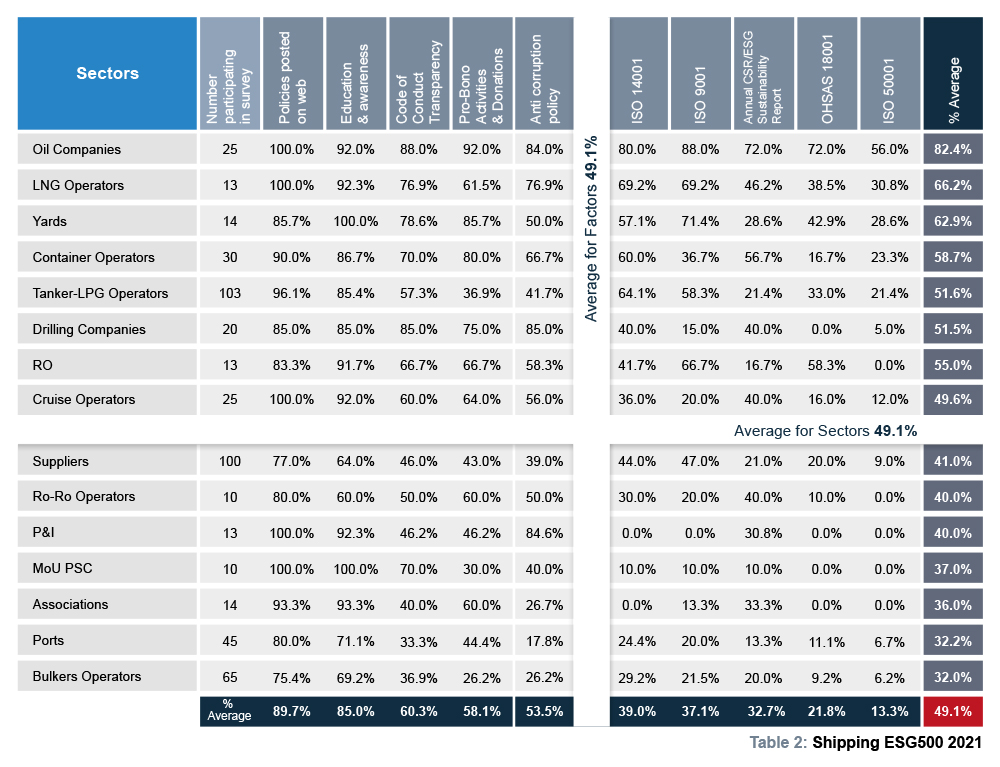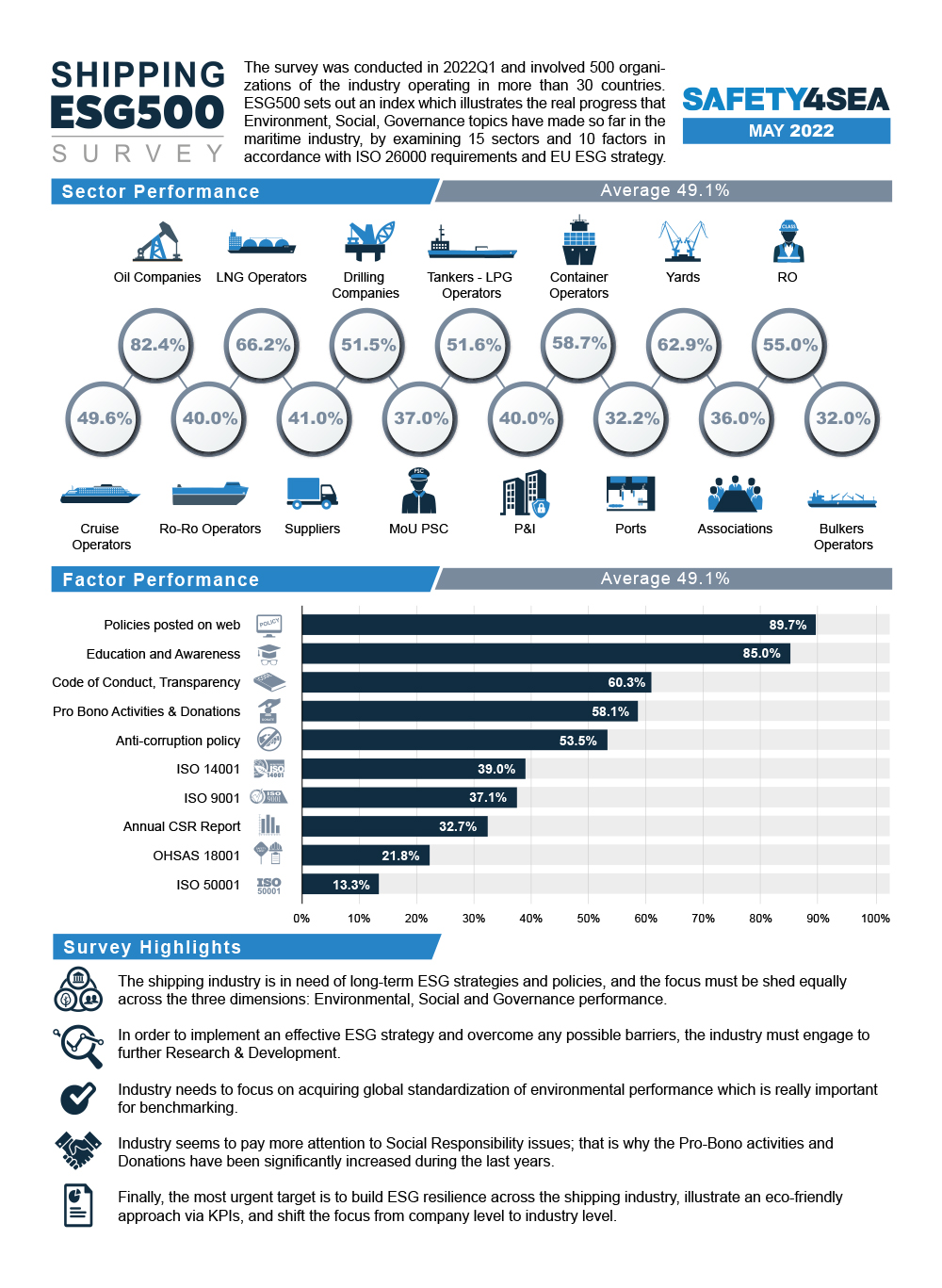SAFETY4SEA “Shipping ESG500 Survey” sets out an index illustrating the progress that ESG (Environmental, Social, Governance) has made so far within the maritime industry, revealing that industry’s ESG performance stands at 49.1%. With slow but steady steps, the figure shows that the industry is on the right track for embracing ESG strategies.
The survey was conducted in Q1 2022 by examining 15 sectors and 10 factors in accordance with ISO 26000 requirements and EU ESG strategy (Table 1). The information used for the ESG500 Survey was found in reports available online and published between 2019 – 2021. All findings were based on analysis of publicly available information, and the most commonly used terms globally seem to be ‘Corporate Social Responsibility’, ‘ESG’ and ‘Sustainability’ report. Reports under these terms along with the companies’ data were included in the survey.

The ESG500 Survey was initially conducted in a total of 1,867 shipping related companies; 500 of them were ultimately chosen to provide a representative sample of the industry composition. Table 1 shows the categorization of the factors selected to fit and comply with the industry’s activities and concerns according to ISO 26000.
Companies across fifteen sectors in the industry were examined: Oil Companies, LNG Operators, Drilling Companies, Tanker-LPG Operators, Container Operators, Yards, Recognized Organizations, Cruise Operators, Ro-Ro Operators, Suppliers, MoU PSC, P&I Clubs, Ports, Associations and Bulker Operators.
The methodology of the survey was based on a Yes/No method: in case a company reference entailed an activity imprecision or omission (report, announcement etc.) the result was thereby interpreted as a ‘No’. Solely clear and outright answers provided in any type of report (ESG, CSR, Sustainability etc.) have been collected during the survey. Therefore, the extracted performance level was based on estimation and may be subject to changes if reports themselves change or if companies get more thoroughly involved in ESG issues. Following the methodology described as above, the ESG index for 2022 found the ESG performance to be at 49.1%.


Survey Key Findings
- The five top rated sectors are: Oil Companies (82.4%), LNG Operators (66.2%), Yards (62.9%), Container Operators (58.7%) and Recognized Organizations (55%).
- Companies illustrate their ESG performance mainly via: publishing ESG policies on their corporate websites (89.7%); conducting education training and awareness (85%); implementing a Code of Conduct (60.3%); engaging in Pro-Bono activities and Donations (58.1%); and implementing an Anti-corruption policy (53.5%).
- The number of companies issued Annual ESG Reports shows a major increase the last five years: up to 32.7% of the companies, in comparison to 10.9% in 2017, are in favour of communicating their ESG strategies.
- Significant increase it is also noticed in education and awareness in the last five years; up to 85% of the companies engage in their crew’s skills and training, in comparison to 57% in 2017.
- The industry also seems more involved in the community; up to 58.1% of the companies choose to support communities, local or not, in comparison to 39% in 2017, in an effort to improve their social responsibility practices.
- The underperforming sectors of the survey are: Bulk Operators (31.8%), Ports (32.2%), Associations (36%) and MoU PSC (37%).
The five top rated sectors are the ones with the strictest legislation framework, and that alone results in their increased overall ESG performance. The implementation of the ESG index has many positive impacts on the shipping industry, including crew welfare, protection of the marine environment, respect for human rights, business ethics and most importantly, stakeholder engagement. Stakeholder engagement is also the reason why ESG reporting is of outmost importance, since it’s a way of enhancing the communication with them, take their view-points and interests and ensure the report’s accessibility and credibility to external audiences.
Survey Highlights
- The shipping industry is in need of long-term ESG strategies and policies, and the focus must be shed equally across the three dimensions: Environmental, Social and Governance performance.
- In order to implement an effective ESG strategy and overcome any possible barriers, the industry must engage to further Research & Development.
- Industry needs to focus on acquiring global standardization of environmental performance which is really important for benchmarking.
- Industry seems to pay more attention to Social Responsibility issues; that is why the Pro-Bono activities and Donations have been significantly increased during the last years.
- Finally, the most urgent target is to build ESG resilience across the shipping industry, illustrate an eco-friendly approach via KPIs, and shift the focus from company level to industry level.


































































